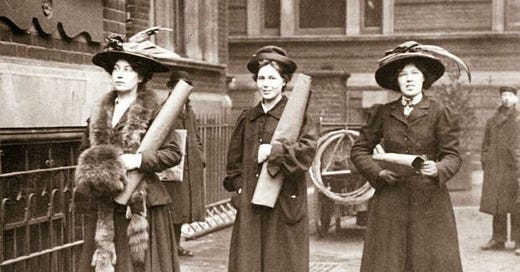The Origins of Fugazi Feminism: How We Mistook Captivity for Liberation
An outlawed take on feminism’s great fraud: dismantling the illusion from the outside in.
(Free Substack – March 5, 2025)
🔥 March is Women’s History Month, and all month long, I’m diving deep into the unraveling of modern feminism—how it lost its way, how it got stuck inside a colonized framework, and what it means to reclaim a truly sovereign, feral feminine power.
This is the first post in an ongoing eight-part series.
Today, we’re starting with the beginning—how feminism was always shaped in Eve’s image and what was lost when Lilith self-exiled.
__
When we talk about the origins of feminism, the story almost always starts with the First Wave—women fighting for suffrage, legal rights, and access to the systems that had excluded them for centuries.
It’s a story about progress. About how women finally gained power.
But what if the story of feminism isn’t one of liberation—but of domestication?
Because from its very beginning, feminism was built inside a colonized, religiously conditioned framework—one that gave women new freedoms but never led them to sovereignty.
Feminism began in the image of Eve—not just the domesticated woman, but the woman who is defined by the system she lives in, even when she believes she is rebelling against it.
Eve is the woman who seeks permission, validation, and legitimacy from the world that tamed her.
And feminism—at least the version we were given—was always a fight to be included, not a fight to be free.
First Wave Feminism: Eve’s Rebellion Was Still Inside the Cage
“The word ‘revolution’ itself means a full circle: a return to the same point. The women’s revolution will be a break-out, not a re-run.”
— Mary Daly, Gyn/Ecology
The First Wave of feminism, starting in the late 19th century, is often seen as the foundation of women's rights in the West. Suffragettes, legal activists, and reformers fought for voting rights, property ownership, and access to education.
But what wasn’t questioned?
The legitimacy of the system itself. Women weren’t rejecting male-created power structures—they were fighting for access to them.
The morality that shaped gender roles. Many First Wave feminists leaned on Christian ideals of “moral womanhood” to justify their cause, arguing that women’s virtue would improve politics.
Who feminism was actually for. This movement prioritized white, middle-class women. Black, Indigenous, and working-class women were either excluded or expected to fight for their own rights separately.
These women were not fighting for sovereignty. They were negotiating for a better position within the existing hierarchy.
And in doing so, feminism remained tethered to Eve’s framework—playing by the rules of a world built by men.
Mary Daly was right—reform is not revolution.
The First Wave feminists didn’t break free; they ran in a circle, demanding entry into institutions built on the very values that had oppressed them. They wanted the vote, careers, and power within the state, but they never questioned whether those structures should exist at all.
They didn’t realize they were asking to be let into the house when true liberation was outside of it altogether.
The Illusion of Choice: How Eve’s Cage Expanded
Here’s the trick of Fugazi Feminism: It convinces you that you’re free because you have more options—not because you have sovereignty.
Feminism, as it evolved, gave women choices—but all of those choices were still shaped by the same cultural framework.
The housewife and the CEO.
The obedient, modest woman and the hypersexualized, “empowered” woman.
The stay-at-home mother and the career-driven #GirlBoss.
Different paths. Same maze.
Because whether a woman chooses marriage, career, sexual liberation, or financial independence, if her sense of freedom is still shaped by cultural approval, she is still within Eve’s world—a world that tells her what power should look like instead of letting her define it herself.
Feminism fought for women to be let into the house. Lilith never wanted the house. She was already in the wilderness, waiting for us to remember where we came from.
“But Without Eve, We Wouldn’t Have Civilization”
Some might argue: If we had followed Lilith instead of Eve, we wouldn’t have civilization.
But that assumption is rooted in colonized thinking—the idea that civilization must be built on control, obedience, and moral domestication.
A civilization built in Lilith’s image wouldn’t be a chaotic wasteland. It would be a different kind of civilization.
One that evolved alongside nature, rather than trying to dominate it.
One that honored intuitive, cyclic, and reciprocal ways of living instead of rigid hierarchies.
One where power wasn’t based on who can accumulate the most wealth, resources, or influence, but on who can live in deep alignment with their own essence.
Lilith’s world would still have structure—but it would be organic, self-governing, and sovereign.
Eve’s world needed domestication to survive. It needed women who were willing to play the game—whether as devoted wives or as feminist revolutionaries demanding entry into the halls of power.
Feminism Was Always Eve. Lilith Was Exiled.
If feminism had chosen Lilith instead of Eve, it wouldn’t have:
Fought for equal wages inside a capitalist system designed to exploit everyone.
Centered legal and political recognition as the path to freedom.
Turned into a corporate-friendly, empowerment-lite movement that is more about branding than sovereignty.
It wouldn’t have argued that women should have more opportunities to succeed in a broken system—it would have demanded an entirely new way of being.
Lilith would never have begged to be included. She would have burned the system down and built something else.
But feminism, as we know it, never went that far. It remained domesticated. It fought for a better seat at the table instead of questioning who built the table, and why we’re even sitting at it.
What Comes Next?
Feminism, in its current form, is stuck. It keeps trying to reform a structure that was never meant to serve women in the first place.
And for the women who feel it in their bones—that something is still off, that something deeper, older, and wilder was lost along the way—
It’s time to remember.
Because Lilith is still here. She was never truly erased.
And if we want real liberation, we have to stop mistaking options for freedom.
We have to stop thinking the system will ever give us permission to be something it cannot control.
Because it won’t.
And it never will.
—
🔮 Next Substack (Paid) – Friday, March 8: “From Fugazi to Feral: Rewilding Feminism”
What would feminism have looked like if it had embraced Lilith instead of Eve? If we had chosen sovereignty over integration? We’re going there.
📩 Subscribe for full access.
Psst, Psst — 💡 If this moved you, share it. If it shook something loose in you, spread it. But let’s get one thing straight—lifting, stealing, and repackaging this work as your own? That’s some peak Eve energy.
See, Eve wants the glory without the grit. She desires the aesthetic of power but not the initiation that forges it. She has forgotten how to create, so she takes. She has forgotten how to be sovereign, so she mimics. She builds nothing of her own, only reflections of what she wishes she had earned.
Lilith, on the other hand? Lilith creates from the bone marrow of her own being. She doesn’t steal—she births. She doesn’t seek validation—she embodies.
So if this work resonates with you, credit it, honor it, and pass it forward. Because real magic isn’t stolen. It’s cultivated. What’s that saying going around?
Oh yea— Be Lilith, not Eve.
Thank you in advance for being Lilith. XO 🔥
About the Author
Chriselda Pacheco is a political heretic and the founder of The Lilith Academy, a shadow work ecosystem for women, specializing in decolonization, Christian deconstruction, and the reclamation of feminine primordial power. A retired sex worker, independent journalist, writer, philosopher and politically homeless thinker, she examines the intersection of sex, power, myth, culture and politics with a razor-sharp wit. As a consecrated Neo-Luciferian Gnostic priestess (2014), she weaves esotericism, cultural critique, and unapologetic storytelling to expose the hidden machinery of empire and the collective shadows we refuse to face.
Find her courses, services and unfiltered takes at www.thelilithacademy.com.






👏🙌💯🔥🔥🔥